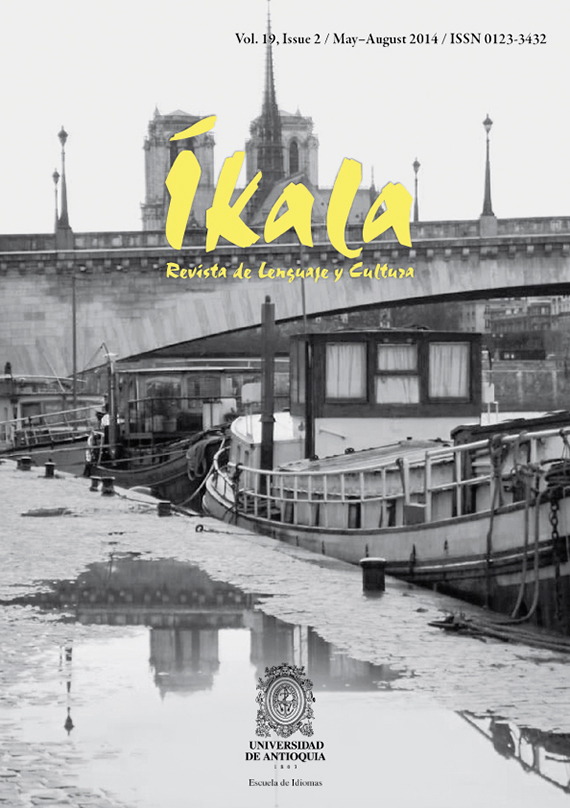The Construction of Facebook as an Affective Prosthesis
DOI:
https://doi.org/10.17533/udea.ikala.v19n2a03Schlagworte:
communication practices, computer-mediated communication, Facebook, linguistic market, virtual socializingAbstract
The current use of Facebook has developed a series of changes in the agents’ communication practices. This article identifies the solid changes that have occurred from a students’ population in one public school in Bogotá. The following research gathered data from participants’ Facebook Wall and in-depth interviews in order to highlight these transformations. This research was framed within a qualitative approach and phenomenological methodology. The results showed that for the majority of this student group, Facebook became an affective prosthesis, which allowed users to virtualize their emotions linguistically withinthe dynamics of a linguistic market.
Downloads
Literaturhinweise
Bórquez, R. (2007). Pedagogía crítica. México: Trillas.
Canagarajah, S. (2006). What are the issues? TESOL Quarterly, 40(1), 9-34.
Cárdenas, M., & Nieto, C. (2010). El trabajo en red docentes de inglés. Bogotá, DC: Biblioteca colección general.
Creswell, J. (2007). Research Design: Qualitative, Quantitative, and Mixed Methods Approaches. United States of America.
Crookes, G. (2003). A Practicum in TESOL: Professional development through teaching practice Cambridge: Cambridge University Press.
Crookes, G. (2009). The practicality and relevance of second language critical pedagogy. American Association for Applied Linguistics conference, 1-16.
Freire, P. (2000). Pedadogy of the oppressed. New York, NY: The Continuum International Publishing Group, Inc.
González M., A. (2007). Professional development of EFL teachers in Colombia: Between colonial and local practices. Íkala, revista de lenguaje y cultura, 12(18), pp. 309-332.
Gounari, P. (2008). Devolviéndole lo crítico al lenguaje: una agenda crítica en la pedagogía de los idiomas. Revista Educación y Pedagogía, 10(51), 51-64.
Johnson, K. E. (1996). The role of theory in L2 teacher education. TESOL quarterly, 35(4). pp. 765-771.
Kincheloe, J. (2004). Critical pedagogy. New York, NY: Peter Lang Primer.
Kumaravadivelu, B. (2001). Toward a postmethod pedagogy. TESOL quarterly, 30(4). pp. 537-560.
McLaren, P. (1998). Life in schools: An introduction to critical pedagogy in the foundations of education (3rd ed.). New York: Longman.
Norton, B., & Toheey, K. (2004). Critical pedagogies and language learning. Cambridge: Cambridge UniversityPress. 327-346.
Pennycook, A. (1990). Critical pedagogy and second language education. System, 18(3), 303-314.
Pennycook, A. (1999). Introduction: Critical approaches to TESOL. TESOL quarterly, 33(3). pp. 765-771.
Pennycook, A. (2004). Critical moments in a TESOL praxicum. In B. Norton & K. Toohey (Eds.) Critical Pedagogies and Language Learning. Cambridge: Cambridge University Press. 327-345.
Pérez, M.S., & Canella, G. S. (2011). Using situational analysis for critical qualitative research purposes. Qualitative inquiry and global crises. Walnut Creek, CA: Left Coast Press, 97-117.
Downloads
Veröffentlicht
Zitationsvorschlag
Ausgabe
Rubrik
Lizenz
Copyright (c) 2014 Íkala, Revista de Lenguaje y Cultura

Dieses Werk steht unter der Lizenz Creative Commons Namensnennung - Nicht-kommerziell - Weitergabe unter gleichen Bedingungen 4.0 International.












